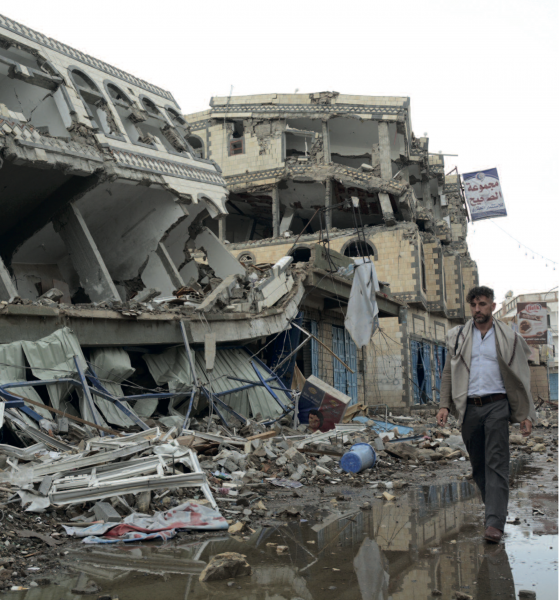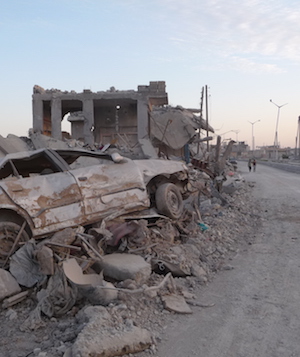Today, the UN Secretary-General released his report “One Humanity: Shared Responsibility” in preparation for the World Humanitarian Summit. The Summit, to be held this May, will aim to address some of the most serious challenges that states, international organisations and civil society face in responding to the needs of people caught up in conflict, disasters and other crises. The Secretary-General’s report aims to identify these problems and sets out an agenda for how they can be dealt with. It recognises the use of explosive weapons in populated areas as a key issue.

The city of Sa’ada has been heavily hit by airstrikes during the conflict in Yemen in 2015 (Philippe Krops/OCHA)
The use in populated areas of explosive weapons, particularly those weapons with wide area effects, is a prominent humanitarian problem that has been recognised by states, the UN, the International Committee of the Red Cross (ICRC) and the NGO community as a cause of both immediate and long term harm and devastation for civilians. Such explosive weapon use generates a range of serious needs through causing terrible injuries, displacement and the destruction of civilian infrastructure vital for health, education and sanitation, with the immediate impacts of destruction also generating and driving further problems for communities (with for example the destruction of water supply systems putting people at greater risk of disease). The ability of humanitarian responders to meet these needs is itself impeded by such bombing and bombardment, given the danger to aid workers, cutting off of access routes and destruction of agencies’ supplies and property that it can entail.
The Secretary-General notes in today’s report that “the use of explosive weapons in populated areas is the primary killer of civilians in conflict,” drawing attention to this issue as a key humanitarian problem on which steps must be taken. Explosive weapons are identified as a theme under the second “core responsibility” he identities for states, which is to uphold the norms that safeguard humanity. He emphasises that “those who plan or decide to launch barrel bombs, mortars, rockets, or other explosives with wide-area effects into urban areas can easily anticipate that they will cause excessive harm and destruction by killing large numbers of civilians, destroying homes, severely hindering critical services, and leaving behind explosive remnants of war for years” – the impact of these practices are and should be well known to the international community and those involved in armed conflicts.

Devastation in the city of Kobane, Syria (© Handicap International)
Today’s report builds on the recognition that the Secretary-General has been giving this issue in recents years, through official statements, reports on the protection of civilians in conflict, and most recently in an unprecedented joint warning with the President of the ICRC regarding the impact of today’s conflicts on civilians. He has also consistently called for action from states on this issue, reiterating in his latest report that “firm political commitments to constrain the use of these weapons are an essential step”, in a section entitled “stop bombing and shelling populated areas.” He suggests that states should review and exchange practice to minimise the impact on civilians of explosive weapons, and monitor their progress in reducing the humanitarian impact of explosive weapons.
In September 2015, Austria started discussions on developing an international political commitment on preventing harm from the use of explosive weapons in populated areas. Such a commitment by states would represent an important step towards addressing this issue, by acknowledging the harm caused and committing to action to respond to it concretely. The Secretary-General has encouraged states to participate constructively in this process, and more than 25 states have already expressed their support for action on this issue. A change in practice with respect to how explosive weapons are used in today’s increasingly urbanised conflicts is urgently needed, and a collective response from states is required to meet this challenge.
At the World Humanitarian Summit in May in Istanbul, Austria and INEW will be holding a side event to raise awareness amongst states of this pressing humanitarian issue, and to gather support for an effective response. More details on the event will be posted soon.
Read more
Read A Commitment to Act: INEW’s briefing book on the problem of explosive weapons in populated areas and how states can respond with an international political commitment
Explore global recognition of this problem and support for international action by states and others
The Secretary-General’s report is available here
